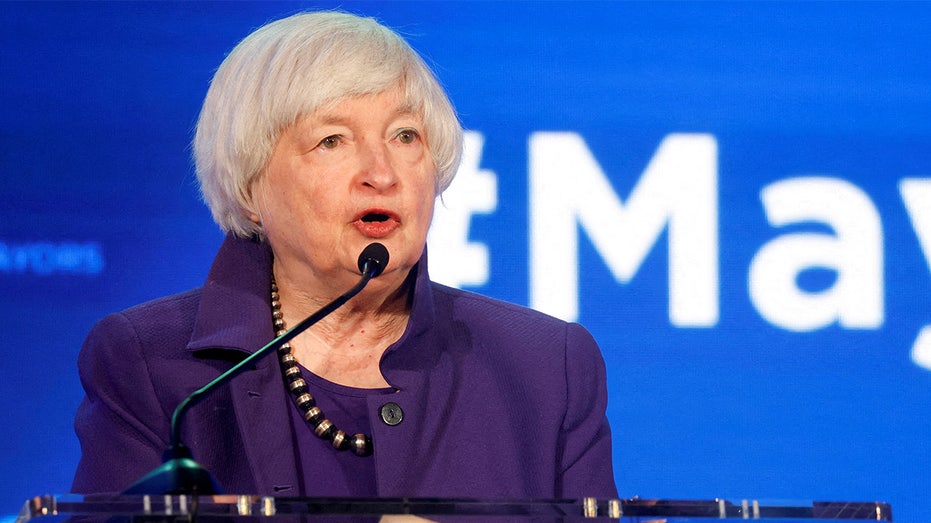Global minimum tax in limbo after some European resistance
Poland vetoed the global minimum tax, casting uncertainty on the landmark agreement
Steve Moore: Janet Yellen's global tax deal 'new low point'
Fox News contributor Liz Peek and economist Steve Moore discuss America's tax rates on 'Kudlow'
A landmark global deal to impose a minimum tax rate on corporate profits ran into a major roadblock last week after Poland vetoed a European Union plan to implement the measure at the end of 2023.
More than 130 countries reached a long-awaited agreement last year for a 15% global minimum corporate tax and other policies aimed at cracking down on international tax avoidance. Negotiations, which lasted for years and often seemed on the brink of collapse, were bolstered by the support of President Biden and Treasury Secretary Janet Yellen.
FED RAISES INTEREST RATES FOR FIRST TIME IN 3 YEARS, PROJECTS 6 MORE HIKES AS INFLATION SURGES
But efforts to formally install the minimum tax have since stalled out in both the U.S. – Congress has moved slowly to approve any proposal – and the EU.
Poland vetoed the measure last week during the second meeting of EU finance ministers to discuss the matter, potentially imperiling the deal because a unanimous decision is required among the 27-member voting bloc in order for it to adopt the initiative. Other EU nations, including Malta, Estonia and Sweden, have also expressed concern about the path of implementation, though they said the proposal put forth on Tuesday addressed their fears.

European Finance Ministers gather, Friday, Feb. 25, 2022 in Paris. European Union leaders put on a united front after a six-hour meeting that went into early Friday morning, during which they agreed on a second package of economic and financial sanct ((AP Photo/Francois Mori))
"We strongly believe that we should be mindful of placing an additional burden on European businesses without ensuring the digital giants are fully taxed," Magdalena Rzeczkowska, Poland’s deputy finance minister, said in a statement.
It is unclear what happens next; French Finance Minister Bruno Le Maire said that he was "absolutely not convinced" by Poland's stance and promised to put the issue back on the agenda of the next EU finance minister meeting.
Corporations employ a litany of tactics to reduce their tax liability, often by shifting profits, and revenues, to low-tax countries such as Bermuda, the Cayman Islands or Ireland, regardless of where the sale was made. The practice by American and foreign multinationals costs the U.S. tens of billions of dollars each year, according to the Treasury Department.
By getting all countries to agree to a minimum corporate tax rate, the Biden administration is seeking to eradicate certain tax havens without hurting the competitiveness of American firms. Yellen has repeatedly said that a global tax, which would apply to companies' overseas profits, would eliminate what she's described as a "global race to the bottom" in terms of corporate taxes.

The Group of Seven major economies will convene a task force to focus on freezing and seizing assets of key Russian elites as it aims to put further pressure on Russia after its invasion of Ukraine, U.S. Treasury Secretary Janet Yellen said on Tuesda (BERLIN/WASHINGTON / Reuters Photos)
The Organization for Economic Cooperation and Development has pushed for years to eliminate corporate strategies that "that exploit gaps and mismatches in tax rules to avoid paying tax." The global minimum tax would apply to companies' foreign earnings, meaning that countries could still establish their own corporate tax rate at home.
The Washington-based organization previously estimated the agreement, which was signed by 137 countries and jurisdictions, will reallocate $125 billion of profits from around 100 of the world's largest and most profitable multinational corporations to countries worldwide thus "ensuring that these firms pay a fair share of tax wherever they operate and generate profits."
GET FOX BUSINESS ON THE GO BY CLICKING HERE
Lobbyist groups in the U.S. have also argued that a global minimum tax rate could hurt U.S. competitiveness by driving business out of the country.





















